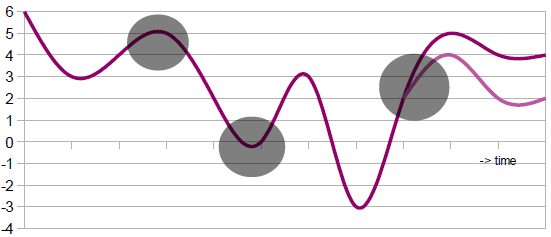A typical learning setting is set out below. The horizontal axis describes time, the vertical axis describes the feeling associated with the project and its outcomes.
From an evaluating perspective, the linear parts might be less interesting. The most valuable sources for reflection are the curve’s turning points and the ambiguous areas (confusions, sources of learning). The confusions represented by the turning points in the curve confront us with uncertainty and ambiguity. Experiential learning strengthens the ability to deal with these challenges by learning from them.
Furthermore, it must be taken into account that the learning process itself consists of different micro-processes that are circular in themselves. People learn through a circular process of action, conceptualization and evaluation. Learning is in that sense a spiral– action/gaining experience, reflecting, concluding, moving on (Kolb & Kolb 2005)[1]. Consequently, experiential learning processes include space for experience and regular meta-reflection.
References
- ↑ Kolb, Alice Y.; Kolb David (2005): Learning Styles and Learning Spaces: Enhancing Experiential Learning in Higher Education; in: Academy of Management Learning & Education; Vol. 4, No. 2 (Jun., 2005); pp. 193-212
Nils-Eyk Zimmermann
Editor of Competendo. He writes and works on the topics: active citizenship, civil society, digital transformation, non-formal and lifelong learning, capacity building. Coordinator of European projects, in example DIGIT-AL Digital Transformation in Adult Learning for Active Citizenship, DARE network.
Blogs here: Blog: Civil Resilience.
Email: nils.zimmermann@dare-network.eu


